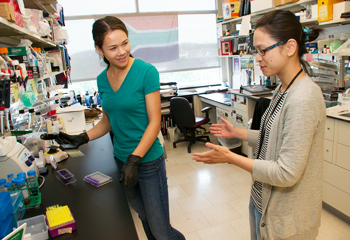Experts Advisory: Breast Cancer Research
ALBANY, N.Y. (October 9, 2015) -- With more than 1.6 million new cases and 520,000 deaths reported each year worldwide, breast cancer remains one of the deadliest forms of the disease. Complicating treatment is the fact that there are several subtypes of breast cancer, and each brings different risk factors and prognoses.
 |
|
Researchers at CRC are developing new methods to treat breast cancer, and novel dietary approaches toward breast cancer prevention. (Photo Mark Schdmidt)
|
For example, triple negative breast cancer (TNBC), a type of the disease where cells are negative for the three common breast cancer markers (estrogen, progesterone receptors, or human epidermal growth factor receptor-2), has shown to be aggressive, unresponsive to traditional treatment and indicative of a poor prognosis. TNBC alone accounts for almost 20 percent of all new breast cancer diagnoses.
While October is Breast Cancer Awareness Month, scientists at UAlbany’s Cancer Research Center (CRC) are examining the most deadly forms of the disease year-round, including TNBC, inflammatory breast cancer, brca-2, and claudin-low. Researchers at CRC are developing new methods to treat breast cancer, and novel dietary approaches toward breast cancer prevention.
Cancer Research Center post-doctoral associate Rebecca Sinnott DeVaux is studying an RNA gene that could distinguish indolent from life-threatening breast cancers. Successful results could reduce the incidence of unnecessary treatment procedures, such as mastectomy, invasive lumpectomy and radiation therapy.
UAlbany’s breast cancer experts include:
- JoEllen Welsh, Empire Innovations Professor of environmental health sciences: Welsh studies nuclear receptors in health and disease. The Welsh lab has particular expertise in studying the role of dietary-derived ligands for nuclear receptors in cancer prevention and therapy. Recent projects have focused on the molecular mechanisms by which vitamin D and its nuclear receptor modulate adiposity, stem cell function and cancer development. She recently received funding from the National Cancer Institute to examine the impact of vitamin D and other natural products on hyaluronic acid metabolism and signaling in triple negative breast cancer.
- Ramune Reliene, assistant professor of environmental health sciences: Reliene studies the role of DNA repair genes and environmental agents in cancer etiology and the role of antioxidant-rich foods and nutrients in cancer prevention. The Reliene lab is currently examining the role and molecular mechanisms of pomegranate extract in breast cancer prevention and treatment. The lab uses cellular and whole animal models including DNA repair deficient mice and various molecular and microscopic techniques and high throughput genomic technologies.
- Douglas Conklin, associate professor of biomedical sciences: Conklin and his group use high-throughput gene function studies to identify new genes important to human cancer cells. Dr. Conklin is a developer of an RNA-based technology that has revolutionized genetic studies in mouse and human cells. His lab uses this technology at the UAlbany Cancer Research Center to identify and study druggable targets for breast and other cancers. Their work has yielded a number of publications and patents related to cancer cell metabolism and signaling. In 2014, Conklin received a $50,000 investment from the SUNY Technology Accelerator Fund to examine the impact of Bruton's Tyrosine Kinase (BTK) inhibitors in cancer suppression.
- Jason Herschkowitz, assistant professor of biomedical sciences: Recipient of a National Institutes of Health award to aid the career of a promising cancer-research scientist, breast cancer researcher Jason Herschkowitz arrived at UAlbany in fall 2013 to advance his work at the University’s Cancer Research Center, located on the East Campus. Herschkowitz works with long non-coding RNAs to develop a greater understanding of the molecular mechanisms that regulate breast cancer stem cells -- critical for devising new treatments that selectively target these aggressive and therapy-resistant cancer cells.
- Martin Tenniswood, director of the Cancer Research Center and Empire Innovations Professor of biomedical sciences: The Tenniswood laboratory has recently shown that histone deacetylase inhibitors initiate cell death of inflammatory breast cancer cells by blocking cell division. Based on these findings Dr. Tenniswood is collaborating with colleagues at the University of Notre Dame to develop new therapies for triple negative (TNBC) and HER 2+ breast cancers using second generation taxol derivative and novel Aurora Kinase B inhibitors.
![]() For more news, subscribe to UAlbany's RSS headline feeds
For more news, subscribe to UAlbany's RSS headline feeds
A comprehensive public research university, the University at Albany-SUNY offers more than 120 undergraduate majors and minors and 125 master's, doctoral and graduate certificate programs. UAlbany is a leader among all New York State colleges and universities in such diverse fields as atmospheric and environmental sciences, business, education, public health,health sciences, criminal justice, emergency preparedness, engineering and applied sciences, informatics, public administration, social welfare and sociology, taught by an extensive roster of faculty experts. It also offers expanded academic and research opportunities for students through an affiliation with Albany Law School. With a curriculum enhanced by 600 study-abroad opportunities, UAlbany launches great careers.


